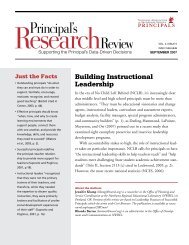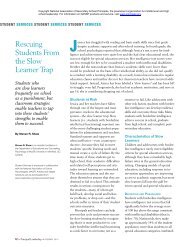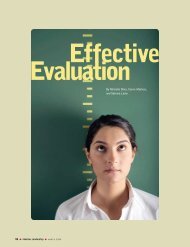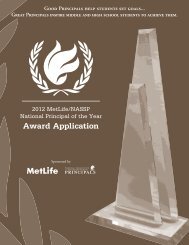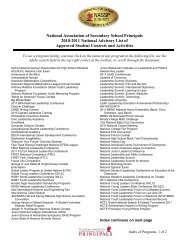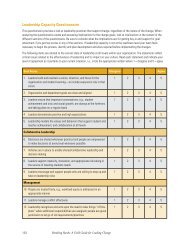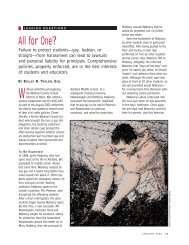A Legal - National Association of Secondary School Principals
A Legal - National Association of Secondary School Principals
A Legal - National Association of Secondary School Principals
Create successful ePaper yourself
Turn your PDF publications into a flip-book with our unique Google optimized e-Paper software.
A <strong>Legal</strong> Memorandum Summer 2006Impartial TribunalThe courts have generally used a standard <strong>of</strong> actual bias,rather than appearance <strong>of</strong> bias, thus providing ample latitudefor the prosecutorial participation <strong>of</strong> school administratorsand for the adjudicatory participation <strong>of</strong> the school board inthe hearing process (e.g., Remer v. Burlington Area Sch. Dist.,2002, and Brewer v. Austin Indep. Sch. Dist., 1985).Other Procedural AspectsThe weight <strong>of</strong> judicial authorities clearly sides with wideconstitutional latitude for other procedural parameters <strong>of</strong> suchhearings. For example, the New York courts have held that themore relaxed standard <strong>of</strong> substantial evidence,rather than the typical civilstandard <strong>of</strong> preponderantAt the extreme inpro<strong>of</strong>, applies in suspensionhearings (Bd. <strong>of</strong> Educ.terms <strong>of</strong> state laws,<strong>of</strong> City Sch. Dist. v. Mills,Minnesota’s Pupil2002). Similarly, a federalcourt in Virginia wasFair Dismissal Actnotably deferential to therequires the writtenboard in rejecting variousnotice <strong>of</strong> expulsion student challenges to theconduct <strong>of</strong> his expulsionto include informationhearing, concluding, forabout free or low-cost example, that violations <strong>of</strong>state law and local policylegal assistance, thewere not per se evidence <strong>of</strong>lack <strong>of</strong> which invalidatedthe student’slack <strong>of</strong> constitutional dueprocess ( J.S. ex rel Duck v.Isle <strong>of</strong> Wight County Sch.expulsion in one case. Bd., 2005). Yet, again,state law and local policyprovide exceptions. For example, in an Ohio case (Kresser v.Sandusky Bd. <strong>of</strong> Educ., 2001), the court overturned a student’sexpulsion because the superintendent held a hearing 20 daysafter the written notice to the parents—well after the 5-dayrequirement in state law. Similarly, a Wisconsin appellate courtnullified a school board’s expulsion <strong>of</strong> a student because theboard had opted, per state statute, to delegate the matter to anindependent hearing <strong>of</strong>ficer—who held a hearing and decidedagainst expulsion—and said that statute only authorized theschool board to review hearing decisions (Madison Metro. Sch.Dist. v. Burmaster, 2005). At the extreme in terms <strong>of</strong> statelaws, Minnesota’s Pupil Fair Dismissal Act requires the writtennotice <strong>of</strong> expulsion to include information about free or lowcostlegal assistance, the lack <strong>of</strong> which invalidated the student’sexpulsion in Z.K. (2005).In some cases, the problem is the district’s failure toswitch gears when extending a short-term removal to oneexceeding the 10-day limit. For example, a federal court inSouth Dakota ruled against a school district that failed to fulfillboth the general principles <strong>of</strong> Goss and the specific requirements<strong>of</strong> state law upon converting a short-term suspension toa long-term suspension without written notice and a hearing(Wain v. Todd County Sch. Dist., 2005). Similarly, a federalcourt in Texas found it unacceptable that the district failed toprovide the requisite written notice and a semi-formal hearingbefore extending a student’s transfer to an alternative schoolfrom 10 days to the last four months <strong>of</strong> the student’s senioryear (Murphy v. Fort Worth Indep. Sch. Dist., 2003).In other cases, a student’s otherwise robust proceduraldue process claim under the Fourteenth Amendment orstate law loses its potency because <strong>of</strong> an admission <strong>of</strong> guilt ora parental waiver. For example, in Porter v. Ascension Parish<strong>School</strong> Board (2004), the 5th Circuit concluded that thestudent’s admission <strong>of</strong> guilt substantially lessened the hearingrequirements and that the parents’ waiver <strong>of</strong> the hearing metthis prevailing standard for effectiveness “when it was placedin writing after a student’s parents consulted with an attorney,was signed after all potential repercussions and consequenceshad been rationally evaluated, and stated in several placed thatthe student was entitled to a hearing” (p. 624).Similarly, the specific circumstances <strong>of</strong> the case and theparticular predilections <strong>of</strong> the judge(s) may play a decisiverole in these cases. For example, in a California case, the appealscourt found that the school board’s policy to never issuesubpoenas in student expulsion hearings violated the applicablestate statute. Nevertheless, the five high school studentsaccused <strong>of</strong> sexual battery lost the case for failure to show a“miscarriage <strong>of</strong> justice” (Woodbury v. Brown-Dempsey, 2003).More specifically, the court’s equitable sense <strong>of</strong> the situationis reflected in its following conclusions:There was not the slightest indication that any<strong>of</strong> the named witnesses for whom subpoenas weresought had any relevant information to impart.[The advocate’s] entire conduct <strong>of</strong> the proceedingson the students’ behalf exposed his manifest purposes:delay, obstruction, obfuscation, disruption, harassment—inshort, anything other than an attemptto determine the factual truth <strong>of</strong> the charges againstthe accused students…. We also find it significantthat the students and their representatives walkedout <strong>of</strong> the hearing. They never availed themselveseven <strong>of</strong> the due process rights they were afforded….[The board members] were not required to kowtow
Summer 2006 A <strong>Legal</strong> Memorandum to such belligerent truculence; thus we could notfind any abuse <strong>of</strong> discretion under these facts in failingto issue the demanded subpoenas.Zero-Tolerance ExpulsionsIn general, courts have accorded wide deference to zerotoleranceexpulsion policies in terms <strong>of</strong> Fourteenth Amendmentdue process. For example, in Ratner v. Loudoun CountyPublic <strong>School</strong>s (2001), the Fourth Circuit upheld the onesemesterexpulsion <strong>of</strong> a middle-school student who inadvertentlyviolated the district’s zero-tolerance weapons policy,concluding that the “school <strong>of</strong>ficials gave [the student] constitutionallysufficient, even if imperfect, process” (p. 142).The concurring judge characterized the case as an example <strong>of</strong>“good intentions run amuck…. But alas...this is not a federalconstitutional problem” (pp. 143–144). However, suchpolicies have been somewhat more vulnerable on substantivedue process grounds (e.g., Seals v. Morgan, 2000), whichare beyond the scope <strong>of</strong> this overview but which generallyonly apply to consequences that are so disproportionate asto “shock” the sense <strong>of</strong> fairness (e.g., Mandell v. Bd. <strong>of</strong> Educ.,1997). As exemplified by Lyons v. Penn Hills <strong>School</strong> District(1997), the primary focus for judicial review <strong>of</strong> zerotolerancepolicies have been in terms <strong>of</strong> statutory interpretationrather than constitutional determination.ConclusionContrary to the dire predictions in Justice Powell’s dissentingopinion in Goss, the majority’s “unprecedented intrusioninto the process <strong>of</strong> elementary and secondary education”(p. 585) has neither taken up most <strong>of</strong> the time <strong>of</strong> school<strong>of</strong>ficials nor caused an “indiscriminate reliance upon thejudiciary” (p. 594). The courts have interpreted the Gossruling and rationale to afford school <strong>of</strong>ficials rather relaxedlatitude in meeting the flexible procedural prerequisites<strong>of</strong> the Fourteenth Amendment. The primary exception isattributable to state and local policies that have codifiedrequirements beyond Goss’s constitutional minimum.Thus, principals would be well advised to examine notonly the relevant court decisions in their jurisdiction butalso—with even more strict scrutiny—any applicable state lawand local policies that govern the procedural protections forstudent suspensions and expulsions. In general, the proceduralrequirements are generally proportional to the extent <strong>of</strong> theremoval from the educational process, with brief in-schoolsuspensions at one end <strong>of</strong> the spectrum and long-term, zerotoleranceexpulsions at the other end. Goss remains as alive andapplicable today as it was 30-plus years ago and has not causedfear or paralysis for any “fair-minded school principal” aswas feared by some (p. 739). First, as the dissenters observed,“maintaining order and reasonable decorum in school buildingsand classrooms is a major educational problem, and oneTime to renewyour membership?Continue to receive the tools you need tobe an effective school leader. Keep your liabilityinsurance, legal assistance, and other resources—including A <strong>Legal</strong> Memorandum—working foryou. Look for your membership renewal noticein the mail and encourage others to becomeinvolved.
A <strong>Legal</strong> Memorandum Summer 2006which has increased significantly in magnitude in recent years”(p. 591–592). Second, as the Goss majority recognized, aprocedurally proper suspension or expulsion is “not only to bea necessary tool to maintain order but a valuable educationaldevice” (p. 580). LMReferences❑Bd. <strong>of</strong> Educ. <strong>of</strong> City Sch. Dist. v. Mills, 741 N.Y.S.2d 589 (App.Div. 2002)❑❑Brewer v. Austin Indep. Sch. Dist., 779 F.2d 260 (5th Cir. 1985).Butler v. Oak Creek-Franklin Sch. Dist., 116 F. Supp. 2d 1038(E.D. Wis. 2000)❑2003)❑Camlin v. Beecher Cmty. Sch. Dist., 791 N.E.2d 127 (Ill. App. Ct.Cole v. Newton Special Mun. Separate Sch. Dist.,676 F. Supp. 749(S.D. Miss. 1987), aff’d mem., 853 F.2d 924 (5th Cir. 1988)❑Dickens v. Johnson County Bd. <strong>of</strong> Educ., 661 F. Supp. 155 (E.D.Tenn. 1987)❑❑❑❑E.J.W., In re, 632 N.W.2d 775 (Minn. Ct. App. 2001)Goss v. Lopez, 419 U.S. 565 (1975)Johnson v. Collins, 233 F. Supp. 2d 241 (D.N.H. 2002)J.S. ex rel. Duck v. Isle <strong>of</strong> Wight County Sch. Bd., 362 F. Supp. 675(E.D. Va. 2005)❑2001)❑❑❑Killion v. Franklin Reg’l Sch. Dist., 136 F. Supp. 2d 446 (W.D. Pa.Kresser v. Sandusky Bd. <strong>of</strong> Educ. 748 N.E.2d 620 (Ohio Ct. App. 2001)Lake Cent. Sch. Corp. v. Scartozzi, 759 N.E.2d 1185 (Ind. Ct. App. 2001)Lyons v. Penn Hills Sch. Dist., 723 A.2d 1075 (Pa. Commw. Ct. 1997)❑ McFarlin v. Newport Special Sch. Dist., 784 F. Supp. 589 (E.D.Ark. 1992)❑ Madison Metro. Sch. Dist. v. Burmaster, 709 N.W.2d 73 (Wis. Ct.App. 2005)❑ Mandell v. Bd. <strong>of</strong> Educ., 662 N.Y.S.2d 598 (App. Div. 1997)❑ Murphy v. Fort Worth Indep. Sch. Dist., 258 F. Supp. 2d 569(N.D. Tex. 2003), vacated as moot, 334 F.3d 470 (5th Cir. 2003)❑ Nevares v. San Marcos Consol. Indep. Sch. Dist., 111 F.3d 25(5th Cir. 1997)❑ Porter v. Ascension Parish Sch. Bd. 393 F.3d 608 (5th Cir. 2004),cert. denied, 544 U.S. 262 (2005)❑ Ratner v. Loudoun County Pub. Sch., 16 Fed. Appx. 140 (4th Cir. 2001)❑ Remer v. Burlington Area Sch. Dist., 286 F.3d 1007 (7th Cir. 2002)❑ Richie v. Bd. <strong>of</strong> Educ. <strong>of</strong> Lead Hill Sch. Dist., 933 S.W.2d 375(Ark. 1996)❑ Roberts, In re, 563 S.E.2d 37 (N.C. Ct. App. 2002)❑ Seals v. Morgan, 229 F.3d 567 (6th Cir. 2000)❑ Tun v. Fort Wayne Cmty. Sch., 326 F.Supp.2d 932 (N.D. Ind.2004), rev’d on other grounds sub nom. Tun v. Whitticker, 398 F.3d899 (7th Cir. 2005)❑ Wagner v. Fort Wayne Cmty. Sch., 255 F. Supp. 2d 915 (N.D. Ind.2003)❑ Wain v. Todd County Sch. Dist., 388 F. Supp. 2d 994 (D.S.D. 2005)❑ Woodbury v. Brown-Dempsey, 134 Cal. Rptr. 2d 124 (Ct. App.2003)❑ Wooten v. Pleasant Hope R-IV Sch. Dist., 139 F. Supp. 2d 835(W.D. Mo. 2000)❑ Z.K., In re, 695 N.W.2d 656 (Minn. Ct. App. 2005)1904 <strong>Association</strong> Drive, Reston, VA 20191-1537Non-Pr<strong>of</strong>it Org.U.S. PostagePAIDNASSPA LEGAL MEMORANDUM:Vol. 6, No. 4Procedural Due Process forSuspensions and Expulsions




